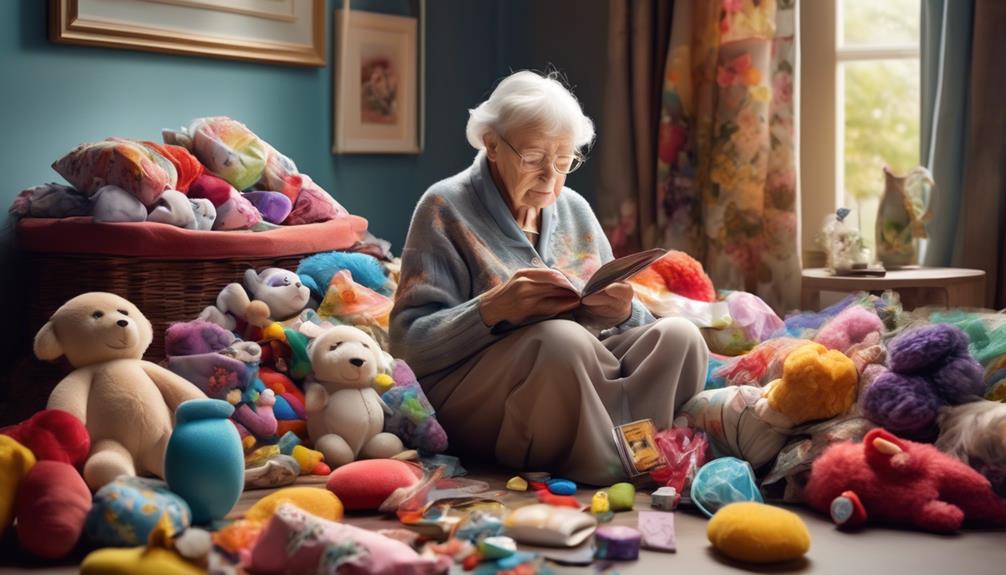Communicating effectively is crucial in connecting with individuals who have Alzheimer’s disease, helping us better understand and address the challenges associated with this condition.
Throughout our journey, we are tasked with crafting meaningful dialogues that transcend the limitations imposed by the disease's progression.
In understanding the significance of tailored communication strategies, we embark on a transformative exploration of connection and empathy in the face of Alzheimer's challenges.
Key Takeaways
- Include the person with Alzheimer's in conversations and adapt communication to their needs.
- Maintain eye contact, use simple language, and allow time for processing information.
- Use one-on-one conversations in a quiet setting, be patient, and pay attention to nonverbal cues.
- Focus on nonverbal cues, use simple language, and show empathy and respect.
Early-stage Communication Strategies
In the early stages of Alzheimer's disease, we mustn't underestimate an individual's communication abilities based solely on their diagnosis. While it's true that people in the early stage of Alzheimer's may struggle to find the right words or experience memory lapses, effective communication is still possible with the right approaches.
It's crucial to include the person with Alzheimer's in conversations, addressing them directly rather than solely interacting with their caregiver or companion. Taking the time to listen attentively to their thoughts, feelings, and needs can make a significant difference in how well they can express themselves.
Finding the communication method that works best for the person with Alzheimer's is key. This could involve using visual aids, simplifying language, or even non-verbal communication techniques.
Effective Communication in Mild Alzheimer's

How can we effectively communicate with individuals in the mild stages of Alzheimer's disease?
When faced with the challenges of dementia and memory loss, it's crucial to adopt specific communication strategies to improve interactions. Here are some key approaches to enhancing communication in the early stages of Alzheimer's:
- Maintain eye contact: Ensuring a connection through eye contact can help the individual feel understood and engaged.
- Use simple language: Simplifying sentences and avoiding complex phrases can aid in comprehension.
- Encourage patience: Allowing time for the individual to process information can reduce frustration and enhance communication.
- Validate feelings: Acknowledging emotions and providing reassurance can foster a sense of trust and security.
Communication in Middle Alzheimer's Stages
Navigating communication in the middle stages of Alzheimer's disease requires employing tailored strategies that prioritize understanding and empathy for the individual's evolving needs and abilities. As cognitive function continues to decline during this stage, effective communication becomes even more crucial for maintaining connections and improving the quality of life for the person with the disease.
| Strategies for Communication in Middle Alzheimer's Stages |
|---|
| 1. Use one-on-one conversations in a quiet setting. |
| 2. Speak slowly and clearly, maintaining eye contact. |
| 3. Allow ample time for responses; be patient and reassuring. |
| 4. Avoid criticism, actively listen, and provide repetition for clarity. |
| 5. Pay attention to nonverbal cues and show respect. |
Implementing these communication skills not only aids in finding the right words but also fosters meaningful interactions, supporting the individual's engagement in social activities and strengthening bonds with family and loved ones in the realm of dementia care.
Communicating in Late Alzheimer's Stages

Approaching individuals in late-stage Alzheimer's with empathy and utilizing nonverbal cues can significantly enhance communication effectiveness and understanding.
When communicating with individuals in late Alzheimer's stages, it's vital to remember that nonverbal communication plays a crucial role. Here are some key points to keep in mind:
- Focus on nonverbal cues: In late-stage Alzheimer's, nonverbal communication becomes more important than verbal communication. Pay attention to facial expressions, gestures, and body language.
- Use simple, clear language: When speaking, use straightforward words and phrases to help individuals comprehend better.
- Encourage nonverbal communication: Utilize pointing, gesturing, and visual aids to facilitate communication and understanding.
- Show empathy and respect: Acknowledge the person's emotions and respond with empathy and understanding, always treating them with dignity and respect.
Basic Communication Tips for Caregivers
Caregivers supporting individuals with Alzheimer's disease can enhance their communication by practicing patience and utilizing simple, nonverbal cues. It's crucial to be aware of memory issues the person may have, so make communication easier by using familiar words and phrases.
Maintaining eye contact helps in capturing the person's attention and shows that you're engaged in the interaction. If the individual has trouble finding the right words, offer gentle suggestions without interrupting their train of thought. Correcting the person if they make a mistake might lead to frustration, so it's better to focus on understanding the message they're trying to convey.
Different forms of communication, such as gestures or drawings, can aid in successful communication when words fail. Asking the person yes or no questions can simplify conversations. Lastly, using non-verbal cues like smiling or nodding can encourage the person with Alzheimer's to express themselves.
Frequently Asked Questions
What Are the Tips for Successful Communication During All Stages of Alzheimer's Disease?
We believe successful communication during all stages of Alzheimer's involves patience, active listening, and adapting to the individual's needs.
Engage in meaningful conversations, speak clearly, and allow ample time for responses. Nonverbal cues and a gentle approach go a long way in fostering understanding and connection.
What Is an Effective Approach When Communicating With a Person Who Has Early Stage Alzheimer's?
When communicating with a person in the early stages of Alzheimer's, we approach with empathy and patience. We use clear, simple language, maintain eye contact, and speak slowly.
Listening actively and allowing time for responses is crucial. Incorporating nonverbal cues and gestures enhances understanding.
This approach fosters effective communication, building trust and connection with the individual as they navigate this challenging time.
What Are Effective Strategies to Support Communication With People Living With Dementia?
When supporting communication with people living with dementia, we focus on clear and simple language, maintaining eye contact, and speaking slowly. Visual aids, gestures, and allowing time for responses are crucial.
Showing empathy, patience, and understanding in all interactions is key. These strategies can enhance communication and help individuals feel heard and respected.
In What Stage of Alzheimer's Disease Is Full Time Care Needed and Communication Becomes Difficult?
In the later stages of Alzheimer's disease, full-time care is often necessary when communication becomes challenging. We may notice individuals struggling to find words or understand language. Nonverbal cues become more important as verbal abilities decline.
It's crucial to focus on emotions and treat them with respect. Adapting our communication style and being patient can help us support them better during this difficult stage.
Conclusion
In conclusion, mastering effective communication throughout all stages of Alzheimer's disease is like planting seeds in a garden – with care and attention, meaningful connections can bloom and flourish.
By tailoring our communication strategies, showing sensitivity, and incorporating various methods of communication, we can continue to connect with our loved ones with Alzheimer's in a meaningful and compassionate way.
Remember, communication is key in maintaining quality of life and fostering connection throughout the journey of Alzheimer's.








